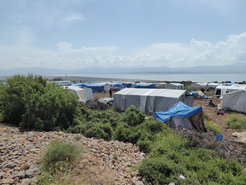Pandemic management in Turkey: tensions and open questions
Autorin: Lale Yalçın-Heckmann
In Turkey daily coronavirus statistics for the whole country have been published since 11th March. Since 1st April regional statistics based on provincial borders have enabled a more differentiated picture. Like other countries, Turkey has established crisis management teams. Yet political tensions and social polarization seem to spill over to affect management of this crisis. The government moved on 21st March to confine those aged over 65 to their homes; it imposed the same measure on those aged under 20 on 3rd April. It has closed schools, suspended many international and domestic flights, banned mass meetings and public prayers, and required the wearing of (and started distributing) face masks in public transport, shops and communal spaces. During the weekend of 10th-12th April, it imposed a comprehensive lockdown on 31 cities, including the megacity of Istanbul. The mayor Ekrem İmamoğlu said he learned about this measure through the media only two hours before it became effective. The Minister of the Interior took responsibility for the chaos that ensued on that Friday evening, but his resignation was not accepted by President Erdoğan. This led to further speculation about who was really responsible.
I have been trying to follow how people are coping with the crisis in Isparta, which featured in news headlines when regional- and city-level data were made public for the first time on 1st April. The city of Isparta, with its 200,000 inhabitants, ranked 6th behind Istanbul, Ankara and Izmir, with their millions of inhabitants. Following the closure of the major university in March, the students had already left the city. Their dormitories were made available for pilgrims (umre hacıları) returning from Mecca who had to be quarantined. Presumably their temporary residence inflated the city’s statistics.1
Isparta is a rose-growing region dependent on migrant agricultural workers, including Syrian refugees, in May and June for the harvest. These workers mostly live crammed together in very poor makeshift lodgings like tents, without access to running water or electricity. They include youngsters under 20 as well as elderly workers over 65.2 How will their health be checked? Will women who are over 65 and commonly belong to the main group of rose pickers be allowed to work? How will they be transported to different fields, if they have to observe ‘social distancing’? Will they come at all?

The crisis is affecting the economic lives of different strata in different ways. When one female official of the ruling party twittered her amazement at panic buying on the grounds that ‘Turkish households always have reserves of food in their deep freeze and their basement,’ her comments were greeted with uproar in the social media. Had the AKP lost touch with the people (halk) it had so long claimed to ‘know’ more intimately than other political parties, whose leaders allegedly only understood western-oriented elites?
In Burdur, close to Isparta, shoppers had to queue up for a kilometre and have their temperature checked before being allowed to enter the bazaar. They were given a face mask but ‘social distancing’ was impossible to observe. One wonders why so many people nonetheless took this risk and bothered to shop under these circumstances. There are several plausible reasons. Many consumers are accustomed to buying large quantities of cheap and fresh products in their locality at their periodic market. The buyers were mostly middle-aged women, many of whom wore şalvar (baggy pants commonly worn in villages) and headscarves. Such women cannot afford to do their bulk shopping from the supermarkets frequented by middle class families. Long queues and the risk of infection is the price they have to pay.
The partial nature of the current lockdown, which allows the majority of workplaces to remain open, makes it harder to take the measures seriously. Some workers have questioned why they have to continue to work, when others do not. It is an open secret that, if there were to be a blanket closure of factories, the fragile Turkish economy would collapse altogether. Of course, many cannot afford not to go work as usual. I am expecting the migrant agricultural workers and Syrian refugees to turn up as usual to pick Isparta’s roses this May.
Notes
1 This was the reason suggested in a tweet by the Member of Parliament (from the ruling AKP party) from Isparta, who then withdrew it a few hours later. See https://t24.com.tr/haber/isparta-daki-268-vakadan-245-i-umreden-donenler-diyen-akp-li-recep-ozel-paylasimini-sildi,870279 published on 2 April 2020, accessed on 2 April 2020.
2 The government has since relaxed the law for agricultural workers, permitting them to work outside the home from the age of 18 but not those above 65. The situation of seasonal workers in Germany was discussed by Sylvia Terpe at this site on 6th April: https://www.eth.mpg.de/5417351/blog_2020_04_06_01
